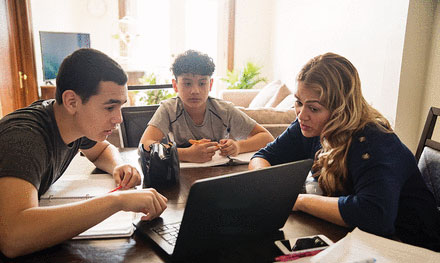General
Unequal impacts: Q&A with Salud America leader Amelie Ramirez on Hispanics and COVID-19
 As COVID-19 spread throughout across the U.S. this spring, it highlighted worsening health disparities faced by minority populations in the U.S., including Hispanics. In April, half of U.S. Hispanics said they or someone in their household had taken a pay cut, lost their job or both because of the coronavirus outbreak. Preliminary data has also shown that Hispanics make up an unequal proportion of coronavirus cases in some states. In a recent podcast, The Nation’s Health spoke with Amelie Ramirez, who is the director of Salud America.
As COVID-19 spread throughout across the U.S. this spring, it highlighted worsening health disparities faced by minority populations in the U.S., including Hispanics. In April, half of U.S. Hispanics said they or someone in their household had taken a pay cut, lost their job or both because of the coronavirus outbreak. Preliminary data has also shown that Hispanics make up an unequal proportion of coronavirus cases in some states. In a recent podcast, The Nation’s Health spoke with Amelie Ramirez, who is the director of Salud America.
How does COVID-19 impact Hispanics in the U.S. differently?
One of the reasons we think (we’re seeing a disproportionate impact) is our population, our Latino community, really has a lot of different co-morbidities that are making it more difficult perhaps to get the treatment that they need.
For example, we have higher rates of diabetes, obesity, cardiovascular disease, asthma in our community, so that if they are impacted by COVID-19, their cases are probably more complicated because of that.
Are there other circumstances that might be leading to the health differences?
What we’re seeing is also our community — a large portion of our community, about 27% of them — live in poverty and we have high uninsurance rates. They also are more likely to be in front-line jobs where they are feeling they can’t take time away by visiting a doctor and getting checked.
The percentage of individuals, I think, is about 16% of Latinos who can really kind of have jobs that allow them to work from home. Therefore, their level of exposure is going to be higher.
Many of them are working in high-contact jobs such as food, retail, hospitality — the ones that are in the hospital helping to clean up, different cleaning services, and things like that. They are around a lot of people and helping transport individuals. Many of these jobs don’t allow them to have that physical distancing that is required.
Do you have other concerns with equity during this pandemic?
The educational impact that this is having on our families, the digital divide.
Many of our families may not have access to computers and if they can’t get access to the libraries for kids to complete their school assignments, that has created an extra strain on our families. Also, some of our children might be receiving some of their breakfasts and lunches at school. Those are additional hardships that families are facing and causing distress to our families.
We don’t know at this point in time if our lower-income school districts have been able to reach out to all their kids. How many of them are actually participating? Of those who haven’t been participating, do we know anything about those kids? So, again, I think it’s shining a light on our educational system as well.
To hear the full conversation, listen to The Nation’s Health Podcast at bit.ly/nationshealthpodcast.
Photo courtesy Martindoucet, iStockphoto


